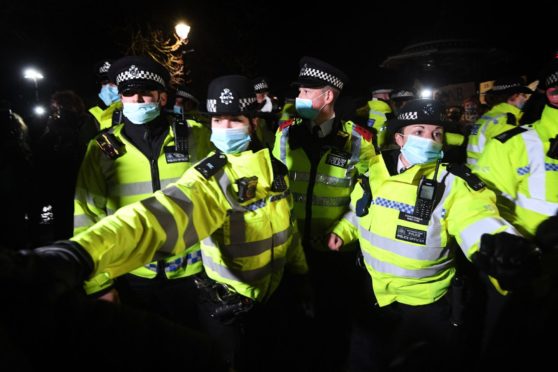Sir, – I read with interest the vociferous public and political response to the police handling of two recent events.
The first was a large mob gathering to celebrate their football club’s cup victory.
They “celebrated” by loud chanting and setting off fireworks and, on this occasion, the police were criticised for being too lenient and generally not doing their job.
I suspect that this was a case of treading on eggshells as to police robustly and make many arrests could have led to an escalation of violence.
Any film I saw suggested that the police were vastly outnumbered and therefore a few strategic pragmatic decisions were probably necessary at the time.
The second was with regard to a vigil marking the horrific and tragic murder of a young woman.
The police attended and arrested a few people. The tabloids don’t help by the use of emotive language such as accusing the police of “wading in”.
On this occasion, the police are being accused of being too heavy handed and there are calls from people who should know better for the commissioner to resign.
Clearly, I fully agree that to detach raw emotion from both events, particularly the latter one, is a difficult thing to do.
If we can, it’ll show that the police are in an invidious if not impossible position.
Of course both events risk triggering an upsurge in Covid, overwhelming the NHS and endangering the police officers the majority of whom have not been vaccinated.
In our democracy, emergency Covid legislation has placed the police in this impossible situation. We have been, since time immemorial, used to generally going about our business and peacefully demonstrating against pretty much any issue without interference.
If it is illegal to gather then it follows that you cannot “police” any such groups of people – as they shouldn’t have been gathering.
To police it would be to condone it and allow the justifiable perception of treating groups differently. There lies a snapshot of the dichotomy facing the police on a daily basis.
Damned if you do and damned if you don’t.
Stewart Falconer.
Glenisla View,
Alyth.
Days numbered for consumption tax
Sir, – VAT would seem to be past its sell-by date.
The pandemic exposed the idea of a tax based on consumption as being a flawed means of raising the finances necessary to provide services to a country.
But it is the environmental aspect that is a more long term reason for changing the tax system of this country.
VAT depends on people spending money on goods, which ultimately leads to more destructive greenhouse gases from their production and transport as well as more landfill from the discarding of unwanted items.
Changing the tax system away from consumption may also allow more high quality jobs to return to this country which would beneficial in so many ways.
The UK Government has had a number of opportunities to respond to the changing world and the environmental demands it places on all countries, but has singularly failed to make a move on this consumption-oriented tax.
A vote for independence will give us the chance to at least put Scotland on the right road.
Rab Mungall.
Lady Campbells Court,
Dunfermline.
No limit to their management skills?
Sir, – I note that the Scottish Government has declared its intent to follow on from its successes in managing Prestwick Airport, Ferguson Marine and BiFab by taking over the running of ScotRail.
Is there no limit to their management skills?
GM Lindsay.
Whinfield Gardens, Kinross.
Local travel means 100 miles to me
Sir, – The SNP tell us that from April 2 the travel restrictions are removed, but we must stay local.
What does this mean?
Local to me means 100 miles, is that what Sturgeon wants?
Ronald James MBE.
Kirriemuir, Angus.










